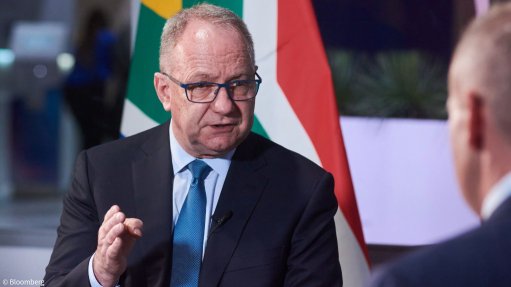Oil prices still struggling but huge potential ahead for Africa
Experts from UK-based Standard Chartered Bank expect the oil price will remain in the $45/bl to $60/bl-plus range.
“We are in a lower for a longer cycle,” Standard Chartered Bank global head of energy and natural resources Peter Gaw told delegates at the Africa Oil Week, in Cape Town.
He said he had seen a greater level of cautious optimism this year compared with the previous two years; however, oil prices were still struggling.
Gaw anticipated that there would not be much upward pressure given the enormous diversity of supply of energy in the world currently.
He added that Africa needed $1-trillion for energy infrastructure, with only two out of five people in Africa having access to a secure supply of electricity.
Gaw said capital investment in Africa had been cut by $100-billion dollars for the next five years.
“Due to the high breakeven price, compared with other sectors, deep-water [oil production] has suffered the most. Nigeria and Angola felt these cuts the most given their dominance in the market.”
Gaw said the lending market in Africa was also “extremely shallow” at present.
“There’s very little liquidity right now . . . We don’t expect local and regional banks to come back anytime soon. Some international banks have fled Africa - some because of regulatory change.”
He said the big challenge was to get the international bank market back into Africa in a more meaningful way.
“We are seeing a lot of liquidity from China. It’s an important source of capital for Africa right now.”
Gaw suggested that government take heed of investor needs.
“Investors want a system where contracts are recognised. They are looking for technical below and above ground risk mitigation. They’re also looking for evacuation plans that have multiple options to avoid security and technical challenges when looking at a deal.”
The Africa Finance Corporation (AFC), meanwhile, said there are enormous opportunities in Africa, but said capital expenditure requirements are also huge.
“We have significant growth potential. Africa holds 7.6% and 7.5% of global oil and gas reserves respectively. This indicates the continent is a big player in the global industry,” said AFC natural resources director Osam Iyahen.
He told delegates at Africa Oil Week that inadequate pipelines, refineries and transport networks were hampering development on the continent.
Social risks were also a feature, with vandalism taking place in Nigeria, where there is a “perception of a lack of benefits to communities”.
Iyahen said if oil- and gas-rich countries in Africa could overcome these hurdles, the industry could be a catalyst for economic development in Africa, as was the case in Norway and Saudi Arabia.
He said the AFC remained bullish and would continue to invest in the oil and gas industry in the long run.
Africa-focused exploration company Impact Oil and Gas executive chairperson Mike Doherty, agreed that there was significant potential for growth in the oil and gas sector in Africa, given its “huge untapped potential” offshore, particularly in deeper waters which were “almost totally unexplored”.
The company has exploration interests in five African countries, including on the east coast and west coast of South Africa, as well as in Namibia and Gabon.
Doherty said there was tremendous potential in the Transkei-Algoa area, where “we think hydrocarbons are indicated within huge fans”.
“The Namibia licence is particularly interesting. We have found an absolutely huge basin floor fan on the edge of the continental boundary.” He said there could be up to five-billion barrels of recoverable oil in the area.
UK-based energy investment firm Citi MD Shreyas Bordia, meanwhile, said there had been an interesting shift globally.
Despite the drop in oil prices and a cut in spending, the North Sea region was fighting back.
“What you have seen over the past year and a half or two years is the creation of a whole new industry of major North Sea independent companies. The combined size of new companies is bigger than all the non-North Sea listed companies in Europe.
“The same thing can absolutely happen in Africa. We need to help new companies to grow.”
Comments
Press Office
Announcements
What's On
Subscribe to improve your user experience...
Option 1 (equivalent of R125 a month):
Receive a weekly copy of Creamer Media's Engineering News & Mining Weekly magazine
(print copy for those in South Africa and e-magazine for those outside of South Africa)
Receive daily email newsletters
Access to full search results
Access archive of magazine back copies
Access to Projects in Progress
Access to ONE Research Report of your choice in PDF format
Option 2 (equivalent of R375 a month):
All benefits from Option 1
PLUS
Access to Creamer Media's Research Channel Africa for ALL Research Reports, in PDF format, on various industrial and mining sectors
including Electricity; Water; Energy Transition; Hydrogen; Roads, Rail and Ports; Coal; Gold; Platinum; Battery Metals; etc.
Already a subscriber?
Forgotten your password?
Receive weekly copy of Creamer Media's Engineering News & Mining Weekly magazine (print copy for those in South Africa and e-magazine for those outside of South Africa)
➕
Recieve daily email newsletters
➕
Access to full search results
➕
Access archive of magazine back copies
➕
Access to Projects in Progress
➕
Access to ONE Research Report of your choice in PDF format
RESEARCH CHANNEL AFRICA
R4500 (equivalent of R375 a month)
SUBSCRIBEAll benefits from Option 1
➕
Access to Creamer Media's Research Channel Africa for ALL Research Reports on various industrial and mining sectors, in PDF format, including on:
Electricity
➕
Water
➕
Energy Transition
➕
Hydrogen
➕
Roads, Rail and Ports
➕
Coal
➕
Gold
➕
Platinum
➕
Battery Metals
➕
etc.
Receive all benefits from Option 1 or Option 2 delivered to numerous people at your company
➕
Multiple User names and Passwords for simultaneous log-ins
➕
Intranet integration access to all in your organisation

















